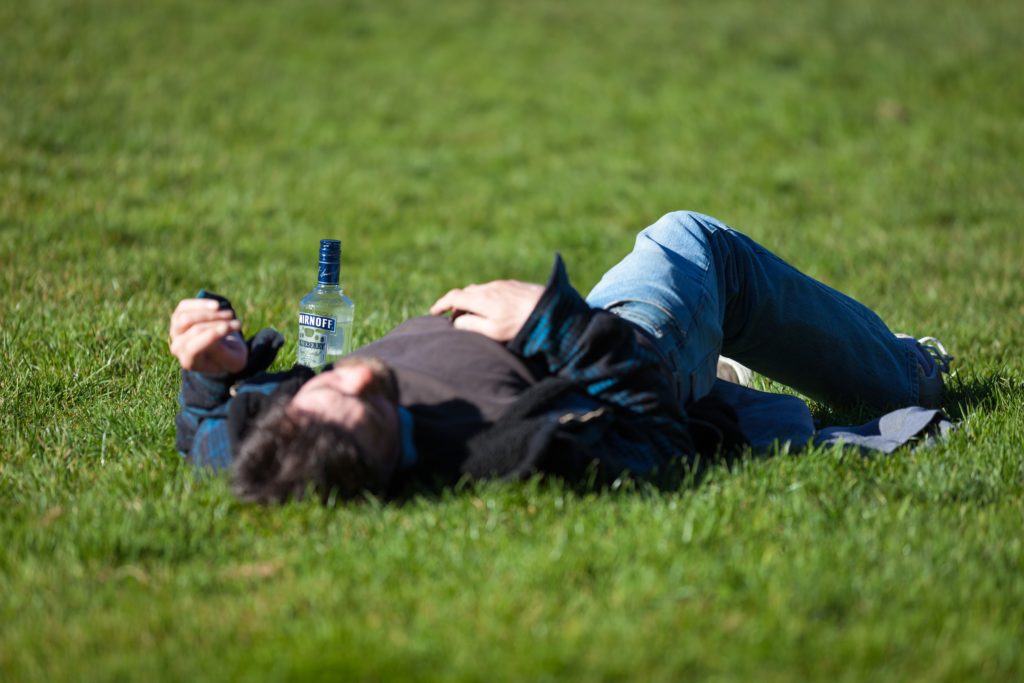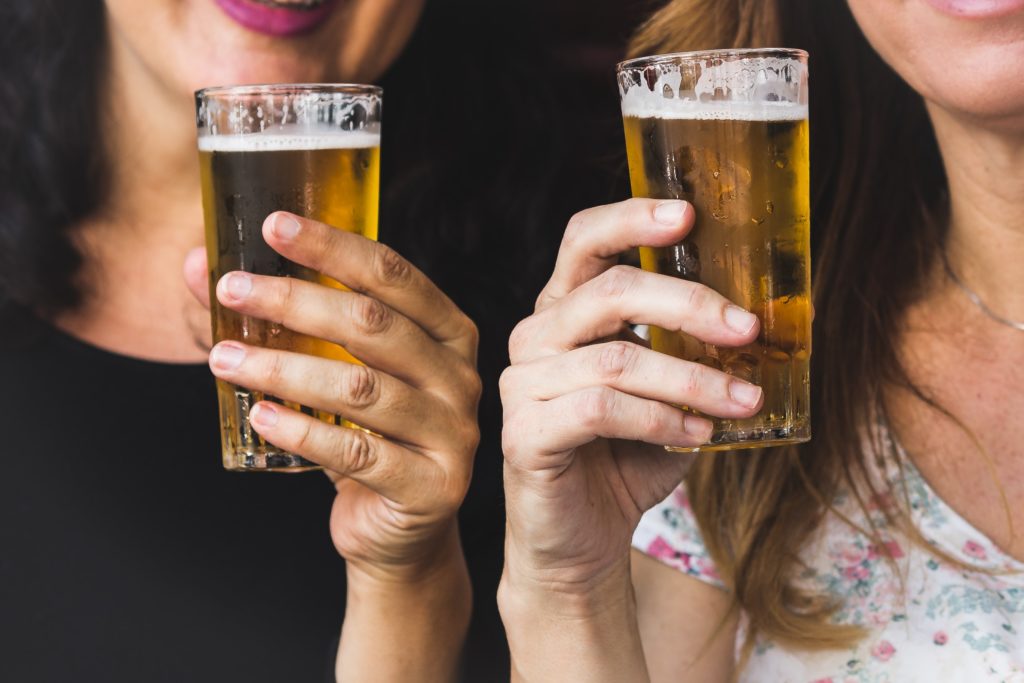
It’s the holiday season again and there are parties every weekend, with work, with friends, with family – they crop up everywhere.
Festive gift bags provided at liquor stores make it easy to present a gift of alcohol in the busy bustle of the season. For some, holiday drinking is light and rare. For others, whose habit of drinking so excessively that it’s harmful to their health and to others, it’s almost continuous. In fact, it can be addictive. But it turns out, there is hope for those who would like to drink less, or stop drinking altogether. There’s a way, beyond sheer will, to dramatically reduce heavy drinking, and avoid the shame that goes with relapse.
Take Jerry, for instance. His wife had suffered from breast cancer for 6 years, and every time they thought she had beat it, new tumors cropped up again. He watched her suffer in pain, with vomiting, severe weight loss, worsening weakness, until she just didn’t have anything to fight with anymore.
She had been in remission for a year, finally, and they were planning a trip to Europe, when suddenly she collapsed one day and tests showed an aggressive form of cancer had spread everywhere. In a matter of weeks, she was deteriorating fast. She died less than a month from the time of her collapse.
Just when they thought they had a future to enjoy together, she was gone. Jerry was devastated. He felt lost, without purpose, disillusioned. And so terribly alone.
The Subtle Slide…
At first, he would drink a couple beers to relax after work in his empty, echoing house. The memories of her reverberated from every corner. After the first swallow of the ice cold beer, a relaxed feeling would wash over him. It felt like relief. Relief from the pain, the sorrow…the stress.
It wasn’t long before 2 beers turned into 3 or 4…then a 6 pack. After that, he graduated to bourbon — or adding vodka to his soft drinks. By the time his wife had been gone a year, he was drunk all weekend every weekend…. and most nights after work.
Friends invited him on outings, to dinner, camping and fishing… but he usually turned them down. He just didn’t feel like socializing…

Five years went by, and Although he managed to keep his job, his performance had dropped off. He hated his annoying itchy skin, and had some pain in his belly off and on… but not too bad. He just ignored it.
One night after he had been to the cemetery to visit her, it started raining. Suddenly, an SUV made a sudden turn in front of him. As Jerry slammed on his brakes his car started spinning. When he realized he had finally stopped, he crawled out of his pickup. His head was bleeding onto his shirt… but the SUV was on its side. He could hear the cries of someone laying about 5 yards down the hill in the dark… then he saw flashing lights. Help was coming…
It all began as grief, but spiraled until he committed a crime, and could have been responsible for someone’s death. Thankfully, no one died. But still…
Jerry was in pain, grief-stricken, and depressed. His heavy drinking was his direct response to his terrible experience with his wife’s cancer and death. And the depression that had taken over left him with no reason he could find to take care of himself, or preserve his life.
The other driver had caused the accident. Still, his blood alcohol was above the legal limit. So, he had to face charges for driving under the influence.
Too Much Drinking Hurts You – and People Near You, Too
While awaiting trial, he went to the doctor to find out about the pain he’d been having. The doctor told him he’d have to cut way back on his drinking. In fact, he urged him to quit altogether, if he wanted to live past the next few years.
It was a wake-up call.
He really didn’t want to die. But could he stop drinking..? He’d tried before… and it always went by the wayside. He needed more help than just trying to use sheer will. He needed something that would help him dramatically reduce heavy drinking. And fast.
So, he started with the internet.
He learned about a variety of 12 step programs. And about residential programs to help you not only stop and get the alcohol out of your system, but to also train you to respond to temptation so you could stay sober.
And he read about promising studies with a medicine called ketamine — something he’d never heard of before.
Jerry got the help he needed with IV ketamine treatment, and got stronger and healthier. He also started seeing a therapist. And he’s finding joy in living again…
But now there are new findings that can help someone like Jerry even more. So you can dramatically reduce heavy drinking.
A recent study — just published a couple weeks ago — has demonstrated that even a single dose of IV ketamine can dramatically reduce harmful drinking. As in, drinking so much that it harms your health and can cause harm to others around you, too.
Ketamine Can Reduce Harmful Drinking By Rewriting Drinking Memories
This is so cool.
A group of researchers in London and Amsterdam conducted a study using ketamine applied to maladaptive reward memories, (MRMs) to see if ketamine can help rewrite those memories and thereby dramatically reduce heavy drinking. R. Das, G. Gale, and their team selected a group of 90 beer drinkers who had hazardous drinking patterns, but had not been diagnosed with alcohol use disorder. Also, no one in this group was seeking treatment for their alcohol consumption lifestyle.

The first day of the experiment, researchers showed all the participants photos of alcoholic drinks that included beer and stronger drinks. Then they asked the participants to rate how strong their desire to drink was. Immediately after this, they gave each participant a cold beer to drink.
On the second day, researchers divided the group into three sub-groups, but didn’t offer beer to anyone.
Here’s where it gets interesting.
With the first group, researchers showed them more photos of drinks to stimulate their memories about the pleasures of drinking. Then they gave them a dose of ketamine.
In the second group. the research team showed them the photos of the drinks, then gave them a placebo drug.
And finally, with the the third group, they showed them no pictures at all. They just gave them a dose of ketamine.
Fast forward 10 days.
The people in Group #1, whose memory was stimulated by pictures, followed by ketamine, reported their consumption of alcohol had dramatically dropped. Then 9 months later, a follow-up revealed their alcohol consumption had dropped to half what it had been before the experiment.
Group #3, who received ketamine without photos to trigger drinking memories, reported a smaller reduction in drinking, but still significantly less alcohol consumption. This was the case at both the 10 day mark and the 9 month follow-up.
Group #2, the placebo group, reported a small decrease in drinking.
So what happened here…?
Ketamine Blocks Memory Restabilization

Das and his colleagues explained that maladaptive reward memories (MRMs) play an important role in “acquired overconsumption disorders” such as hazardous drug and alcohol use. Basically, the reward Jerry feels in terms of relaxation and relief from his grief when he drinks forms a memory, and when he thinks of it, he wants to drink again, even though that may not be good for his health or social, economic, and productive life.
There’s a process that happens in a small time window each time Jerry thinks about having a drink to help him feel better. During that window, his recall of the memory of his relief when he drinks becomes rather fluid and changeable. If something can interfere with that association before he drinks, it can “rewrite” that memory so his desire to drink becomes a desire to do something different.
Das and his colleagues explained that they believe ketamine can block specific receptors in the brain (such as the NMDA receptor) that help to RE-stabilize a memory. That blocking causes the memory to weaken. In this case, it’s the memory of the pleasure of drinking. In Jerry’s case, it might be the relief he feels from his grief when he drinks.
If someone wants to stop drinking, this change to that appealing memory of pleasure gives them the chance to rethink what they believe about alcohol, and what they believe about their health.
It gives them time to make a decision without that alluring maladaptive memory.
Das encourages further study using ketamine to rewrite these MRMs. Because ketamine has demonstrated safety at high doses in anesthesia, they encourage studies using doses that can to saturate NMDA receptors to interfere with these MRMs.
Addiction Relief with IV Ketamine
At Innovative Psychiatry, we’re thrilled every time a patient reports relief from addiction to alcohol or other substances. We get to see patients who’ve suffered from severe depression walk into our office smiling, happy, and full of hope. These people never take their new found wellbeing for granted. Their relief, surprise, and joy are palpable.
IV ketamine treatment works in the brain in ways other medicines haven’t before, and it’s restoring and transforming lives like yours.
Don’t hesitate to call us if you’re plodding through a sorrowful, empty, hopeless existence because other medications and treatments you’ve tried haven’t helped. You still can find relief of depression symptoms and dramatically reduce heavy drinking.
So much we’ve learned. So much more work to do.

Ketamine works on newer and better systems in your brain. It doesn’t help everyone, but it helps so many that we just keep studying to learn how many more it can help. Even so, chances are pretty good that it will reverse your depression, your PTSD, you substance use disorder, and transform your life to one of hope, courage, initiative, and joy.
So think about it a bit. And then give yourself the chance to live a rewarding life.
To the recovery of your very best self,

To the restoration of your best self,
